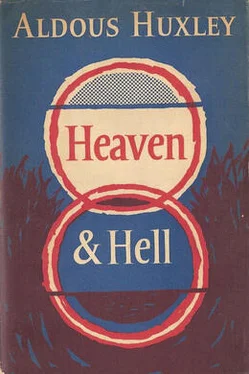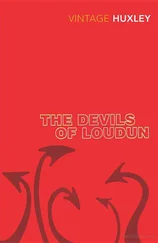From the point of view of an inhabitant of the Old World, marsupials are exceedingly odd. But oddity is not the same as randomness. Kangaroos and wallabies may lack verisimilitude; but their improbability repeats itself and obeys recognizable laws. The same is true of the psychological creatures inhabiting the remoter regions of our minds. The experiences encountered under the influence of mescalin or deep hypnosis are certainly strange; but they are strange with a certain regularity, strange according to a pattern.
* * * * *
What are the common features which this pattern imposes upon our visionary experiences? First and most important is the experience of light. Everything seen by those who visit the mind's antipodes is brilliantly illuminated and seems to shine from within. All colours are intensified to a pitch far beyond anything seen in the normal state, and at the same time the mind's capacity for recognizing fine distinctions of tone and hue is notably heightened.
In this respect there is a marked difference between these visionary experiences and ordinary dreams. Most dreams are without colour, or else are only partially or feebly coloured. On the other hand, the visions met with under the influence of mescalin or hypnosis are always intensely and, one might say, praeternaturally brilliant in colour. Professor Calvin Hall, who has collected records of many thousands of dreams, tells us that about two–thirds of all dreams are in black and white. 'Only one dream in three is coloured, or has some colour in it.' A few people dream entirely in colour; a few never experience colour in their dreams; the majority sometimes dream in colour, but more often do not.
'We have come to the conclusion,' writes Dr Hall, 'that colour in dreams yields no information about the personality of the dreamer.' I agree with this conclusion. Colour in dreams and visions tells us no more about the personality of the beholder than does colour in the external world. A garden in July is perceived as brightly coloured. The perception tells us something about sunshine, flowers and butterflies, but little or nothing about our own selves. In the same way the fact that we see brilliant colours in our visions and in some of our dreams tells us something about the fauna of the mind's antipodes, but nothing whatever about the personality who inhabits what I have called the Old World of the mind.
Most dreams are concerned with the dreamer's private wishes and instinctive urges, and with the conflicts which arise when these wishes and urges are thwarted by a disapproving conscience or a fear of public opinion. The story of these drives and conflicts is told in terms of dramatic symbols, and in most dreams the symbols are uncoloured. Why should this be the case? The answer, I presume, is that, to be effective, symbols do not require to be coloured. The letters in which we write about roses need not be red, and we can describe the rainbow by means of ink marks on white paper. Text–books are illustrated by line engravings and half–tone plates; and these uncoloured images and diagrams effectively convey information.
What is good enough for the waking consciousness is evidently good enough for the personal subconscious, which finds it possible to express its meanings through uncoloured symbols. Colour turns out to be a kind of touchstone of reality. That which is given is coloured; that which our symbol–creating intellect and fancy put together is uncoloured. Thus the external world is perceived as coloured. Dreams, which are not given but fabricated by the personal subconscious, are generally in black and white. (It is worth remarking that, in most people's experience, the most brightly coloured dreams are those of landscapes, in which there is no drama, no symbolic reference to conflict, merely the presentation to consciousness of a given, non–human fact.)
The images of the archetypal world are symbolic; but since we, as individuals, do not fabricate them, but find them 'out there' in the collective unconscious, they exhibit some at least of the characteristics of given reality and are coloured. The non–symbolic inhabitants of the mind's antipodes exist in their own right, and like the given facts of the external world are coloured. Indeed, they are far more intensely coloured than external data. This may be explained, at least in part, by the fact that our perceptions of the external world are habitually clouded by the verbal notions in terms of which we do our thinking. We are for ever attempting to convert things into signs for the more intelligible abstractions of our own invention. But in doing so, we rob these things of a great deal of their native thinghood.
At the antipodes of the mind, we are more or less completely free of language, outside the system of conceptual thought. Consequently our perception of visionary objects possesses all the freshness, all the naked intensity, of experiences which have never been verbalized, never assimilated to lifeless abstractions. Their colour (that hallmark of givenness) shines forth with a brilliance which seems to us praeternatural, because it is in fact entirely natural—entirely natural in the sense of being entirely unsophisticated by language or the scientific, philosophical and utilitarian notions, by means of which we ordinarily re–create the given world in our own drearily human image.
* * * * *
In his Candle of Vision , the Irish poet A. E. (George Russell) has analysed his visionary experiences with remarkable acuity. 'When I meditate,' he writes, 'I feel in the thoughts and images that throng about me the reflections of personality; but there are also windows in the soul, through which can be seen images created not by human but by the divine imagination.'
Our linguistic habits lead us into error. For example, we are apt to say, 'I imagine,' when what we should have said is, 'The curtain was lifted that I might see.' Spontaneous or induced, visions are never our personal property. Memories belonging to the ordinary self have no place in them. The things seen are wholly unfamiliar. 'There is no reference or resemblance,' in Sir William Herschel's phrase, 'to any objects recently seen or even thought of.' When faces appear, they are never the faces of friends or acquaintances. We are out of the Old World, and exploring the antipodes.
For most of us most of the time, the world of everyday experience seems rather dim and drab. But for a few people often, and for a fair number occasionally, some of the brightness of visionary experience spills over, as it were, into common seeing, and the everyday universe is transfigured. Though still recognizably itself, the Old World takes on the quality of the mind's antipodes. Here is an entirely characteristic description of this transfiguration of the everyday world.
'I was sitting on the seashore, half listening to a friend arguing violently about something which merely bored me. Unconsciously to myself, I looked at a film of sand I had picked up on my hand, when I suddenly saw the exquisite beauty of every little grain of it; instead of being dull, I saw that each particle was made up on a perfect geometrical pattern, with sharp angles, from each of which a brilliant shaft of light was reflected, while each tiny crystal shone like a rainbow…. The rays crossed and recrossed, making exquisite patterns of such beauty that they left me breathless…. Then, suddenly, my consciousness was lighted up from within and I saw in a vivid way how the whole universe was made up of particles of material which, no matter how dull and lifeless they might seem, were nevertheless filled with this intense and vital beauty. For a second or two the whole world appeared as a blaze of glory. When it died down, it left me with something I have never forgotten and which constantly reminds me of the beauty locked up in every minute speck of material around us.'
Читать дальше











